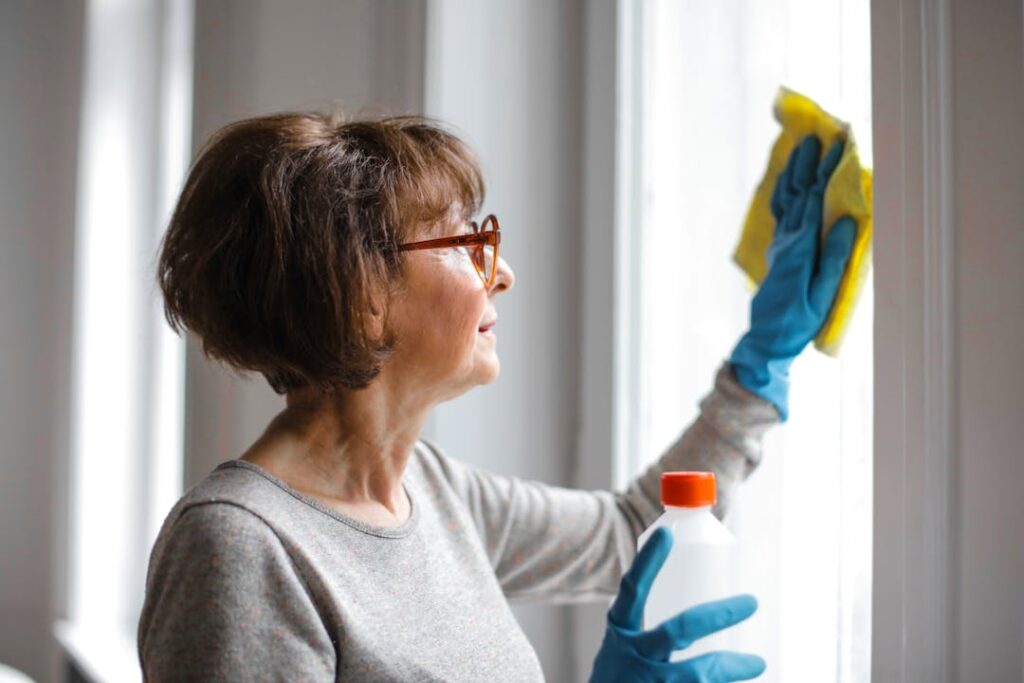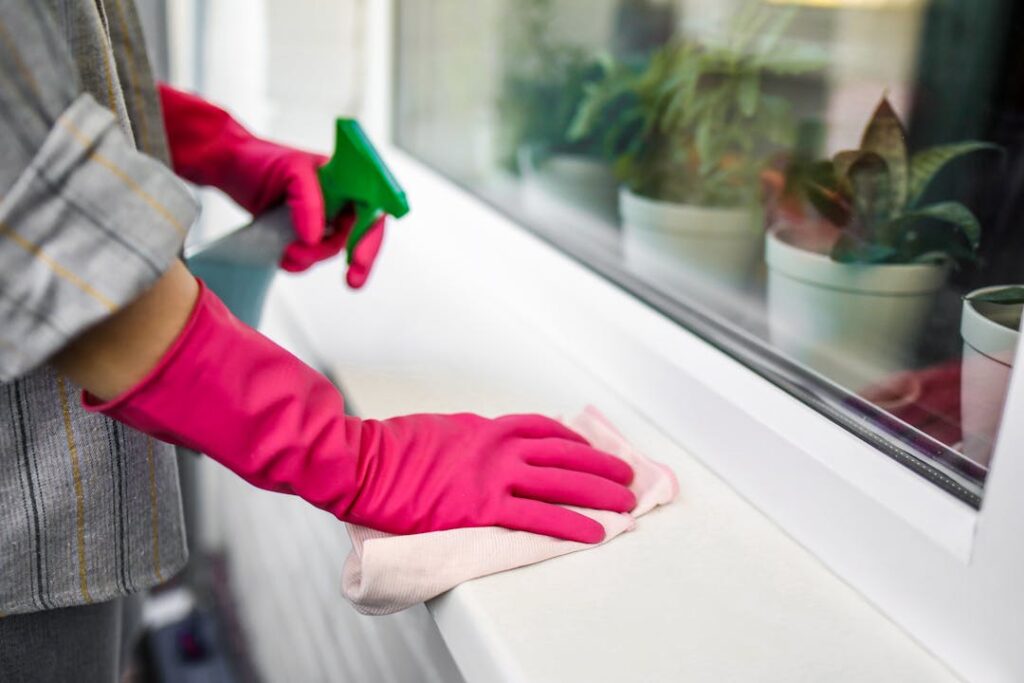You will need vinegar as a window cleaner if you answer ‘yes’ to these questions:
Are your windows looking cloudy and dull and need a new sheen?
Are you tired of the smudges and streaks that appear every time you try to clean them?
In our modern pursuit of eco-friendly and effective cleaning solutions, vinegar is your go-to item.
This humble pantry necessity, often overlooked, possesses remarkable cleaning properties that can rival even the most specialized commercial cleaners.
So, the secret to sparkling windows is vinegar. Chiefly, it can easily cut through dirt, grease, and grime, leaving your windows looking brand new.
In this article, we will delve into the many ways you can use vinegar to clean and polish your windows. Stay put
1. Benefits of Vinegar as a Window Cleaner
Vinegar’s primary cleaning agent is acetic acid, a potent yet natural substance that dissolves dirt, grime, and stubborn stains on windows with ease.
Unlike harsh chemical cleaners, vinegar is gentle on surfaces, making it ideal for delicate glass.
When applied to dirty surfaces, vinegar breaks down the bonds between dirt particles and the window, making it easier to wipe away. Its acidity also helps dissolve mineral deposits and grease, leaving windows clean and streak-free.
Additionally, vinegar’s natural antibacterial properties contribute to a thorough and hygienic cleaning process.
2. Simple DIY Vinegar Solution
I know what you are thinking.
You have the vinegar, and so what?
Right?
How do you then apply it to the window? Do you need to dissolve it, maybe in water or another solution?
Creating your DIY vinegar solution for window cleaning is a breeze. Here’s what you do:
- Prepare the Solution: Start by gathering distilled white vinegar and distilled water. You’ll need equal parts of vinegar and water for an effective cleaning solution.
- Measure the Ingredients: Using a measuring cup or container, pour equal amounts of vinegar and distilled water into a spray bottle. For example, if you use 1 cup of vinegar, add 1 cup of distilled water.
- Combine in Spray Bottle: After measuring, carefully pour the vinegar and water into the spray bottle. Ensure that the bottle is residue-free and clean.
- Optional Additions: For a pleasant scent or enhanced cleaning power, you can add a few drops of essential oils like lemon, lavender, or tea tree oil to the vinegar solution. To mix the contents fully, give the bottle a good shake.
- Label and Store: Once mixed, label the spray bottle with its contents for safety and store it in a cool, dry place away from direct sunlight. Shake the bottle before each use to ensure you combine the ingredients well.
Now, your vinegar solution is ready to use for cleaning windows.
Simply spray the solution onto the window surface, let it sit for a few moments to loosen dirt and grime, and then wipe clean with a microfiber cloth or squeegee for streak-free results.

3. Eco-Friendly and Budget-Friendly
The above vinegar window cleaner solution is a simple yet economical concoction. It not only cleans effectively but also leaves your windows streak-free and sparkling.
Say goodbye to expensive commercial cleaners that often come with harmful chemicals and hefty price tags.
Vinegar, being both eco-friendly and budget-friendly, allows you to maintain clean and clear windows without compromising your health or the environment.
The following attributes make vinegar eco-friendly:
- Biodegradable: Vinegar is a natural product derived from fermented fruits or grains, making it biodegradable. When it rinses off surfaces, it breaks down into harmless substances, reducing its environmental impact.
- Non-Toxic: Unlike many commercial cleaners that contain harsh chemicals, vinegar is non-toxic. It doesn’t release harmful fumes or residues, making it safer for indoor use and better for air quality.
- Sustainable Sourcing: Vinegar production typically involves sustainable practices, such as using renewable resources like fruits or grains. This reduces the reliance on non-renewable resources and supports sustainable agriculture.
- Cost-Effective: Vinegar is often more affordable than commercial cleaners, encouraging budget-conscious consumers to choose a sustainable and economical cleaning solution.
Overall, vinegar’s eco-friendliness stems from its natural origins, minimal environmental impact during use, and cost-effective nature compared to conventional cleaning products.
4. Tackling Tough Stains and Residue
For stubborn stains and residue buildup on windows, vinegar proves its mettle.
Vinegar effectively removes tough stains on windows through its acidic properties and natural cleaning abilities. Tough stains may result from a build-up of hard water (e.g. rain) and mineral deposits. The acidity in vinegar will neutralize this build-up.
Also, vinegar is versatile and can tackle a wide range of stains, including grease, grime, and water spots. Its effectiveness in breaking down various substances makes it particularly useful for dealing with tough stains on windows
Apply the vinegar solution directly to the affected areas, let it sit for a few minutes, then wipe away effortlessly for a spotless finish.
5. Deodorizing and Disinfecting Benefits
Besides cleaning, vinegar boasts deodorizing and disinfecting properties, leaving your windows not just visibly clean but also free from odors.
Its natural antibacterial properties help sanitize and disinfect windows, leaving them hygienic.
Therefore, it’s a wholesome cleaning solution in a single bottle.
6. Enhancing Shine and Clarity
Do you want a gleam with unmatched shine and clarity? You can experience it with vinegar-cleaned windows.
Bid farewell to cloudy residues and welcome a crystal-clear view that enhances the ambiance of your space.
In addition, unlike abrasive cleaners that may scratch or damage window surfaces, vinegar is non-abrasive. It cleans effectively without causing harm, making it suitable for use on delicate glass surfaces.
When handling delicate windows, consider using the experience of experts like prominent cleaners. You don’t want to break windows doing it now, do you?
7. Versatility in Cleaning Applications

Lastly, the beauty of vinegar as a window cleaner lies in its versatility. As a cleaning agent, it reduces the need for multiple specialized cleaners, minimizing packaging waste and the environmental footprint associated with producing and disposing of various cleaning products.
Besides home windows, you can also use vinegar to clean:
- Other glass surfaces
- Kitchen appliances like fridges, cookers, and microwaves
- Counter-tops and tile floors
- Bathroom fixtures like faucets, sinks, toilets, and shower heads
- Laundry, pet areas, and furniture
In a word, vinegar’s versatility makes it a go-to cleaning solution for various surfaces and areas around the home, providing effective and eco-friendly cleaning results.
Indeed, it excels in many areas, proving its status as a multipurpose cleaning champion.
Conclusion: Embrace the Vinegar Revolution
In conclusion, vinegar emerges not just as a window cleaner but as a transformative cleaning agent that simplifies your cleaning routine while delivering exceptional results.
Harness its power, embrace its eco-friendly nature, and witness the transformation it brings to your windows and beyond.
By making it a must-have item in your pantry, you’ll effectively say goodbye to pricey commercial window cleaners. And hello to a more cost-effective and efficient cleaning solution!
Let us know your thoughts on using vinegar as a window cleaning agent in the comments. And if you need help cleaning, engage us.
FAQs
Is vinegar safe to use on all types of windows?
Vinegar is generally safe to use on most types of windows, including glass windows, but it’s essential to test it on a small, inconspicuous area first, especially if you have coated or tinted windows.
Does vinegar leave a strong smell after cleaning?
While vinegar has a distinct smell, it dissipates quickly once it dries. You can also add a few drops of essential oils, like lemon or lavender, to the vinegar solution to mask the smell.
Can vinegar damage window frames or seals?
When used properly, vinegar should not damage window frames or seals. However, avoid letting the vinegar solution sit on wooden frames for an extended period, as it may cause damage eventually.
Is vinegar effective in removing hard water stains from windows?
Yes, vinegar is excellent for removing hard water stains on windows. Its acidic properties help break down mineral deposits, leaving your windows clean and streak-free.
Can I use vinegar to clean windows in cold weather?
Certainly, you can use it to clean windows in cold weather, but it’s best to apply the solution indoors or during warmer parts of the day to prevent it from freezing on the glass surface.
Leave a Reply